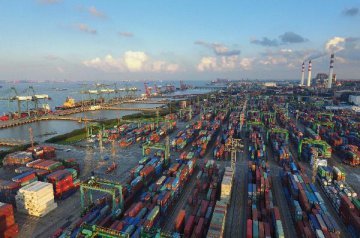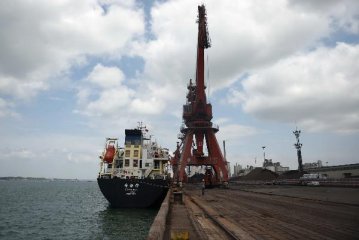
China's four pilot free trade zones, located along the country's developed east coast, are spearheading structural reforms to make it easier to start businesses and grant foreign firms more access to the service sector. Three new pilot zones were founded a year ago in Tianjin Municipality, Fujian Province and Guangdong Province.
The first free trade zone in Shanghai was founded in September 2013 and expanded to include the Lujiazui financial district, a high-tech park and a development zone. These cities and provinces led the nation during China's three decades of rapid growth. Now they have taken on the role of piloting new reforms in their free trade zones, where local authorities have greater discretion to manage business activities and cross-border capital flow.
Loosened controls on capital and widened access to sectors that remain closed or restricted for foreign firms elsewhere have led to a surge in new business registrations and cross-border transactions in the zones. A survey published in September by the American Chamber of Commerce in Shanghai found that 42 percent of American firms are happy with measures to facilitate trade in the Shanghai free trade zone and plan to gain a foothold in the free trade zones in Tianjin, Fujian and Guangdong. Though all will experiment with reforms to be adopted nationwide, the four free trade zones are leveraging their respective strengths and locations.
TIANJIN
The northeast municipality of Tianjin plans to use its free trade zone to serve a greater region in northern China that includes Beijing and Hebei Province. Tianjin has performed well in auto imports and financial leasing compared to the rest of the country. Including these sectors in the free trade zone allows them to grow with fewer restrictions. The financial leasing arm of China's biggest state lender ICBC performed the country's first offshore leasing in Tianjin when it bought an A320 aircraft from Airbus and leased it to Himalaya Airlines in Nepal.
It only takes a month and half for a leasing firm to go from approval to open for business, compared with half a year in the past, a representative with CITIC Financial Leasing Co., Ltd. told Xinhua. "It's tempting to think of people working in bureaucracy as inefficient, but those in the zone work around the clock to move things fast," the representative said. China's HNA Group also completed its investment in Uber in the zone, where companies can carry out offshore investment of less than 300 million dollars without having to seek regulator approval.
GUANGDONG
The free trade zone in south China's Guangdong has been leveraging its proximity to Hong Kong and Macao to encourage more cross-border financial transactions. A total of 13 securities firms and asset managers from Hong Kong have been allowed to invest up to 18.66 billion U.S. dollars combined in China's domestic capital markets. Banks in the free trade zone offer more products for companies looking for merger and acquisition opportunities overseas to hedge against currency exchange risks.
The zone extends cross-border cash pooling services to smaller firms to help corporate treasuries manage cash flow both in and out of China more efficiently. The free trade zone is also expected to produce two joint venture securities firms with a full suite of licenses and majority stakes held by offshore entities of HSBC and Bank of East Asia Tupperware moved its R&D center for the Asia Pacific from Japan to the Nansha District of the Guangdong free trade zone. The zone also houses many start-ups founded by entrepreneurs from Hong Kong and Macao.
FUJIAN
The free trade zone in Fujian has been piloting measures to ease economic exchanges with Taiwan. The Fujian zone has granted speedy customs clearance for 120 Taiwanese products. This has made it possible for fresh fruit picked in the morning in Taiwan to hit the market in Fujian in the afternoon.
Streamlined measures for clearing Taiwanese products for the Chinese mainland have been approved by the General Administration of Customs for use in the other three zones.
In addition to eliminating redundant approvals, authorities in the Fujian zone have also set a time limit for processing applications. Applications will be approved by default if not processed within the limit and authorities will be held accountable for any repercussions. The rule has been copied across the country to improve administrative efficiency.
SHANGHAI
Multinational corporations are increasingly using the Shanghai zone to introduce new services to consumers in China. Apple and Uber have both registered companies in the Shanghai free trade zone as a launchpad for their new mobile payment and ride-hailing services in China.
Shanghai also launched a yuan-denominated gold benchmark this week to offer global investors an alternative to the London and New York gold fixing. International investors in the zone can participate in spot trading of commodities ranging from iron ore and non-ferrous metals to cotton, denominated in Chinese currency and free of tariffs and value-added taxes.
Zone authorities are drafting regulations to allow Chinese households to invest in offshore capital markets. The country currently only allows domestic financial institutions to make offshore investments on a quota basis.




















Latest comments